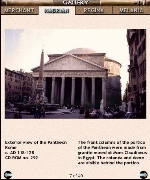
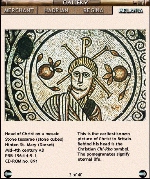
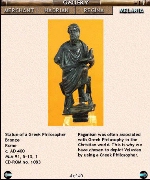
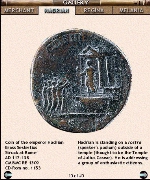
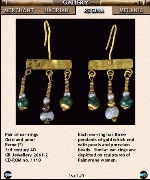
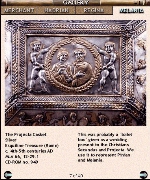
Figure 6 a-f: Gallery images: The Pantheon in Rome; Hinton St Mary mosaic; Statue of a Greek philosopher; A coin of Hadrian; Gold and pearl earrings; The Projecta Casket
Throughout the journeys, the user can refer to a Gallery of 40 important images associated with each journey. These galleries provide large images, which can be printed out, and more detailed information about the site or object. Users can also collect and save images and text on to a 'note pad' for use after completing a journey. Finally, they can place Milestones in journeys so as to refer back at a later date.






Figure 6 a-f: Gallery images: The Pantheon in Rome; Hinton St Mary mosaic; Statue of a Greek philosopher; A coin of Hadrian;
Gold and pearl earrings; The Projecta Casket
Outside the main programme, a Gazetteer of all the sites covered in the four journeys, with brief information on their location and ease of access is included. There is an image list with every image used and a brief description with copyright details. Two bibliographies, one for children and the other for teachers and adults, teacher notes and a list of institutions consulted makes up the complete database.
The major pieces of technical software used are Photoshop, Director and After Effects. As well as images and text, voice-overs and ambient sound are used throughout, and QuickTime Virtual Reality (QTVR) is used on a few occasions.
© Internet Archaeology
URL: http://intarch.ac.uk/journal/issue12/4/support.html
Last updated: Thu Aug 1 2002